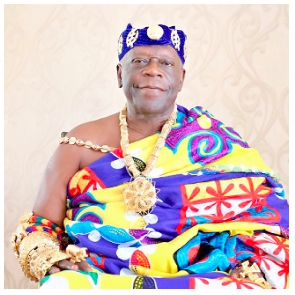He has ruled for over 40 years on the stool as paramount chief and one thing comes to mind when his name is mentioned; royalty with purpose and vision.
His name is Ahunabobrim Nana Prah Agyensaim VI, known in private life as Wellington E. Jonah, chief of Assin Kushea in the Central Region of Ghana.
The 80-year-old chief who is also a lawyer by profession has made his town the envy of the rest of the country and arguably, other parts of the world.
He has not only made Assin Kushea the cleanest and most organized town in Ghana but has managed to get people to buy into the idea of replicating same in their towns.
Nana Prah Agyensaim VI has also built a palace believed to be the biggest in the entire West Africa, while implementing other initiatives to improve his people.
In this piece, we take some of the awe-inspiring things he has done as chief that has transformed his town and earned him admiration.
Cleanest town:
In a country where sanitation issues especially in the capital are particularly becoming disturbing, Nana Prah Agyensaim VI has managed to make his entire community the cleanest in Ghana.
Speaking in an interview with TV3, he explained how that came to be.
“When I became a chief, I told my people that, there was no way I was going to get Kushea to beat the size of Cape Coast but I will do something that will beat everybody; that is to be the neatest town in Ghana – that was achievable.
“I tackled littering…I said from now on, as long as I remain here, we will all together make sure that we don’t litter. But you know, sanitation is a process, you just don’t tell people that you shouldn’t litter when you have not provided them with bins.
“So I decided to provide the whole town with dustbins, cladded in national colours. And I used to go to the schools and talk to kids. I happen to be a lawyer, so you know the law, you know the repercussions when you break it and I worked within the laws and constitution of Ghana. You’ll be on trial, customary and if you are found guilty, you may be asked to go and do a communal labour, pay a token amount, you may be shamed, and people didn’t want to be embarrassed in the palace, in the public,” he said.
So iconic was this transformation that others including the Dormaahene, Osagyefo Oseadeeyo Dr. Nana Agyemang Badu II have emulated same in their towns.
The Dormaahene, speaking on GhanaWeb’s Lowdown said he took a cue from the Central Region Chief to implement the initiative in Dormaa.
“I’ve heard so much about his town that it is the neatest town and in one of my celebrations; I think 22nd or 23rd anniversary on the stool, I had cause to commend him for having chalked that feat.
"So ever since, maybe two or three years, I decided to emulate him to see how I can also lead my people to bring sanitation to their doorsteps to help clean our environment, weed, ensure that we put dustbins and clean our surroundings,” he told GhanaWeb’s Mr. Oduro.
Biggest palace in West Africa:
As part of efforts to promote tourism in his township, Ahunabobrim Nana Prah Agyensaim VI is constructing what is believed to be the biggest palace in the entire West African region.
Sitting on a large acre of land [7.4 acres] said to belong to him, is a palace endowed with a botanical garden, a zoo, massive courtyard and several rooms with kingly and queenly artifacts.
Also on the palace walls are an array of African proverbs, various artifacts, animals, birds among many others with sculptures of dogs positioned at various points within the palace.
Development:.
Ahunabobrim Nana Prah Agyensaim VI also revealed in a TV3 interview that when he arrived in the town as a prince for the 40-day observation following the passing of his uncle who was chief before his demise, there was little to no development.
“There was no light, no pipe-borne water, they were drinking from River Pra and at the time, River Pra was clear. I got a water company, they got some of the water and realized there were organisms in them. I said River Pra is very nice but river diseases are there so I got water here. There was no health post, there was a priestess who was helping ladies deliver their babies, there was no school that I will take my child to, absolutely nothing. We’ve got nice decent roads, now all these things are there.
About Ahunabobrim Nana Prah Agyensaim VI:
Nana, known in private life as Wellington E. Jonah, holds an LLB / BA (Hons) Business Law from Metropolitan University in London in 1976. He is a Barrister at Law and a Solicitor of the Supreme Court of the Republic of Ghana. He has more than 40 years’ experience at senior management level in both Public and Private businesses.
He has been a Business Law Consultant and Lobbyist since 1983. He has been Chairman and Director of several international bodies and corporations.
Nana served as Member, Council of State – Ghana (Constitutional Presidential Advisory Board), Board Chairman of Perseus Mining Ghana Limited, Board member of Maxam Ghana Limited, Chairman of Ghacem Cement Foundation, Board member of Ghacem Cement Limited, Executive Chairman of Industrial and Engineering Service Ghana Limited, Board member of Bayport Ghana Limited, Consultant to PMI and Asante Mining Ghana Limited, Former Board Chairman of Tema Development Foundation.
He served on the Member of State Committee for Economic Co-operation on Bilateral Trade with Ivory Coast and the Member of Government’s Negotiating Team on Bilateral Trade with Bulgaria. Nana is the Paramount Chief of Assin Owirenkyi Traditional Area (Assin Kushea), in the Central Region of the Republic of Ghana. He is also a member of the Central Regional House of Chiefs and is the Life Patron of Assin North Council of Chiefs.
You can also watch today's GhanaWeb news headlines in Twi here
General News of Sunday, 15 October 2023
Source: www.ghanaweb.com













